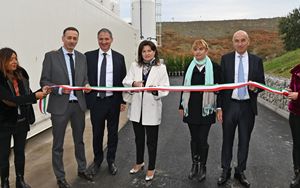(Finance) – Sustainability and Innovation are two of the values that have always guided the action of Marche Multiservices and which have found full implementation today at Cà Asprete landfill in Tavullia with the inauguration of thereverse osmosis system of the latest generation for the treatment of leachate and with the presentation of the Ape Informa project on the biomonitoring of bees launched in 2021.
The investment, equal to almost 1.5 million euroswill allow the leachate that forms when the water passes through the waste of a landfill to be treated, obtaining distilled water also suitable for the life of fish, as demonstrated by the fountain created at the entrance of the plant fed by water deriving from the treatment of the leachate and where many fish swim and live. This is a latest generation plant capable of purifying 90 cubic meters of leachate produced per day, removing up to 99.99% of pollutants, with less energy expenditure, lower maintenance costs and avoiding that, as has happened until now, the material has to be transported by tankers outside the region to special sites suitable for treatment, with the consequent air pollution created by the circulation of vehicles. A saving of 192 tons of CO2 per year (192,000 kg) is estimated, with important and obvious benefits for the environment. The smaller amount of CO2 produced is equal to the emissions offset by almost 1,900 trees each year. The reverse osmosis system will be used for the treatment of leachate also in the post-mortem management of the landfill (30 years).
Since 2021 Marche Multiservizi has started a biomonitoring activity inside the Cà Asprete landfill thanks to the project Bee Informs which provides a contribution to the analysis of the environmental context of the plant. The bee is a key bioindicator for the quality of the environment in the surrounding area: they are very sensitive creatures to environmental changes caused by pollutants and are able to early signal the onset of dangerous imbalances for biodiversity, for the ecosystem and for human health. An apiary consisting of 5 hives was placed in the landfill and in each of them there is a queen bee: each hive can host up to 60,000 bees in the summer period for a total of 300,000 bees that produce honey, pollen, propolis and wax. These are families of ligustic bees, of Italian origin. The Ape Informa project takes place in collaboration and under the scientific supervision of the University of Urbino (Department of Pure and Applied Sciences): bio-morphometric analyzes and veterinary medical checks are periodically carried out on the hives to verify the health and productivity of the bees, to sample the honey, wax and other hive products. Under observation in particular are the toxic and polluting agents that can accumulate, mainly consisting of pesticides, heavy metals, toxic anions and polycyclic aromatic hydrocarbons (PAHs). All the analyzes gave positive results, certifying the quality of the honey produced in the landfill
“I am proud of the investment made in Cà Asprete by Marche Multiservizi and of this day which allows us to show authorities, administrators and citizens how for over 30 years we have been efficiently managing a landfill serving a large part of the provincial territory. The reverse osmosis system allows us to obtain important environmental benefits because it means that we will be able to treat the leachate produced directly here, avoiding having to transport it via tank trucks to special plants outside the region: we are talking about a saving in terms of less CO2 produced equal to 192 tonnes, for approximately 500 fewer trucks in circulation every year. The biomonitoring of bees, carried out thanks to the beekeeper Alex Gabellini and in collaboration with the University of Urbino, is a further element that certifies the healthiness of the surrounding environment”, explains the president of Marche Multiservizi Andrea Pierotti.
“Marche Multiservizi continues to invest in innovation to guarantee ever greater sustainability of the services managed for the benefit of the territory in which it operates – he explains the CEO of Marche Multiservizi Mauro Tiviroli – For the reverse osmosis system we have made an important investment worth approximately 1.5 million euros because we are aware of the environmental benefits it will bring in terms of lower carbon dioxide production. The Cà Asprete landfill is a plant designed, built and managed in an innovative way which demonstrates how waste can be managed at a territorial level with an impact equal to, if not even lower than, other industrial plants”.
